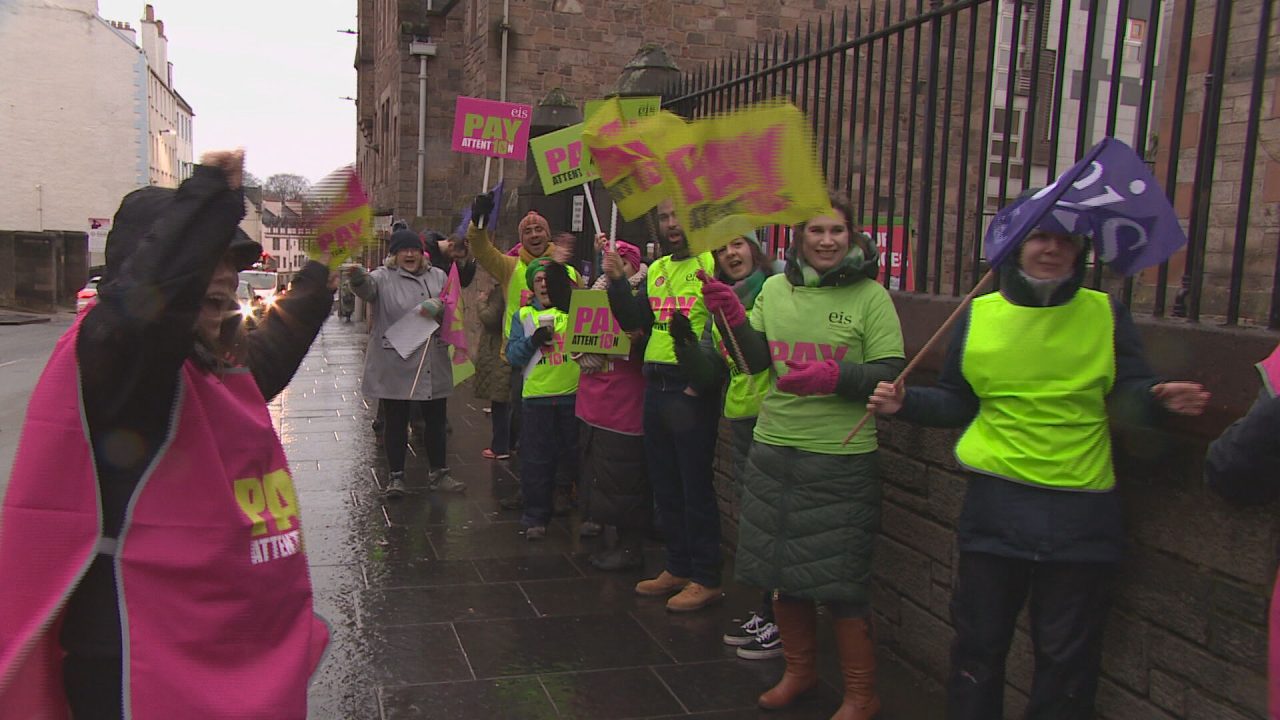Scotland’s education secretary has said she will leave “no stone unturned” to bring about a quick resolution to teacher strikes affecting schools across the country.
Shirley-Anne Somerville responded to questions from opposition MSPs about the ongoing industrial action, with one accusing her of being “chilled out and relaxed”.
Somerville said there is still “some distance” between the two sides in the pay dispute.
On Tuesday, primary schools around the country closed after last-ditch talks failed to prevent strike action, with secondary school staff set to walk out on Wednesday.
Unions have demanded a 10% pay increase but the Scottish Government has offered 5%, including rises of up to 6.85% for the lowest-paid staff.
A meeting of the Scottish Negotiating Committee for Teachers (SNCT), which brings together unions, local authorities and the Scottish Government, took place on Monday in an attempt to avert the strike action.
As the Scottish Parliament resumed following the winter recess, Conservative Stephen Kerr spoke about the SNCT meeting.
He said: “Teachers are on strike for the first time in 40 years, because this SNP Government has repeatedly let them down.”
Somerville said the meeting had been “constructive”, adding that she could not give further details while negotiations are ongoing.
Referring to “anti-trade union” legislation at Westminster, she continued: “I will take no lectures from Mr Kerr or any other Conservative member of this parliament, saying that we should be doing more to actually settle disputes.”
The Lib Dems’ Willie Rennie asked if there would be a new offer for teachers, saying: “The education secretary does seem to be very chilled out and relaxed.”
Somerville said both sides in the dispute would have to compromise in order to reach a resolution, adding: “We will, of course, leave no stone unturned to try and do that as quickly as possible.
“No one wants to see strike action in our schools.”
Speaking on BBC Radio’s Good Morning Scotland programme earlier, Somerville described the union pay demands as “simply unaffordable”.
After talks ended in failure, members of the Educational Institute of Scotland (EIS), NASUWT, Scottish Secondary Teachers’ Association (SSTA) and the Association of Headteachers and Deputes in Scotland (AHDS) are taking strike action.
It follows SSTA and NASUWT members taking two days of action in December while EIS members walked out on November 24.
Asked whether she expected a new offer to be on the table before the end of the week, Somerville said: “We’ll continue discussions with the unions.
“I think the challenge that we have is we remain some distance apart on what the Scottish Government and local government can afford and can put on the table from the union demand which is, of course, a 10% increase in pay.
“If that had been accepted, if the 5% had been accepted, you would’ve actually seen teachers have a 21.8% cumulative rise since 2018.
“So we’re trying very hard to have a fair and affordable package on the table but we do remain unfortunately some distance apart.”
She added: “The pay demands we’re having from our trade union colleagues are simply unaffordable for the Scottish Government working on a fixed budget, already allocated, also eroded by inflation and that does make it a very difficult and challenging process to come to a conclusion and resolution on.”
Earlier in the programme, Mike Corbett, NASUWT Scotland national official, echoed the concerns that unions and Government were still far away from agreement on pay.
He said the last offer made in November was “dressed up as an improved offer” but did not improve pay for the “vast majority of teachers”.
He added: “There’s still no formal revised offer on the table and that is the reason why our members and others feel they’ve got no alternative but to be out on strike again today and tomorrow.”
Nicola Sturgeon also spoke to journalists about the strike on Tuesday.
The First Minister said: “I deeply regret that we have industrial action in our schools.
“I don’t think that’s in the interest of young people at all.
“That said, I understand the strength of feeling of teachers and we highly value the teaching profession.”
However, she said: “I can’t create additional funding that we don’t have and I’ve tried to be really honest with unions across the public sector.
“We’re trying to be as fair as possible while maximising pay increases.”
Follow STV News on WhatsApp
Scan the QR code on your mobile device for all the latest news from around the country




























